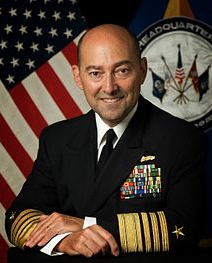
Confronting global challenges of North Korea to the environment, retired Admiral James G. Stavridis laid out the issues the world is facing and possible solutions at World Boston’s 8th Annual Consuls Reception. The event was attended by nearly 60 members of the local Consular Corps and nearly 200 leaders from different sectors of society.
During the 2016 Presidential Election, Hillary Clinton considered Stavridis as a potential Vice-Presidential pick, and he was under consideration for Secretary of State by the Trump administration. Both were impressed by Stavridis’s career in the Navy, and his involvement with the academic spheres of international relations.
Worried about the polarization of U.S. politics, Stavridis has not been a stranger to the political field. He has worked towards bridging the gap between the two parties.
“I feel good about being enough of a centrist that both parties look at me realistically for a very senior job,” said Stavridis.
A registered independent, Stavridis mentioned that he has voted across the aisle throughout the years. Dedicating his whole life to military service, he stressed the importance of putting the nation first.
“We need more Americans that are less party identified, and more identified on what is right with the country,” said Stavridis.
Admiral Stavridis was responsible for Afghanistan, Libya, Syria, Balkans, Piracy, and Cyber Security. He was also in command of 200,000 members of U.S. armed forces, and that he “Had access to three million armed forces members through NATO partners.”
Currently the dean of the Fletcher School of Law and Diplomacy at Tufts University, the Admiral is also an associate member of the Geneva Centre for Security Policy (GCSP).
“[The GCSP] is focused on bringing together communities and interests to discuss major issues facing the world,” said Stavridis.
He has also published several books, including one on the role of the world’s oceans in geopolitics.
During his speech, Stavridis warned about the global world order returning to a state of conflict that led to World War I and World War II. He added that the backward shift occurred because nations became complacent, thinking that great power politics would not return again.
“Tension, competition, verging towards conflict…Between United States, China, Russia, and [the] European Union,” said Stavridis.
To prevent the return of great power politics, Stavridis highlighted the importance of understanding the perspective of other nations.
“We must listen to our opponents we need to understand Russia’s views, China’s historical claims we don’t have to agree but [we have to] listen more,” said Stavridis.
Another subject that the Admiral touched upon was the tension on the Korean Peninsula.
“[There is a] ten percent chance that we will end up in an all-out war,” said Stavridis.
While ten percent is a gloomy prediction, given the potential use of a nuclear weapons in a the conflict, Stavridis argued that it is most likely the conflict will end diplomatically. If an incident does occur, Stavridis believed that it would most likely be a minor one, rather than a nuclear conflict.
Not only did his speech touch upon ongoing global crises, the Admiral offered solutions to the issues plaguing the world. He also argued the importance of the U.S. to not return to isolationism, because the U.S. needs to be an active player in order for the issues to be properly addressed on a global scale.
“We have an ability to bring international coalitions to address global issues,” said Stavridis. Through the strategic cooperation between U.S. intergovernmental agencies, international agencies and other nations, the Admiral said that he believed that the U.S. could make significant strides in combating climate change and responding to natural disasters.
“[I] apologize [on behalf of the country] for U.S. withdrawal from Paris Accord,” said Admiral Stavridis, referencing the Trump administration’s intention to withdraw from the accords on the basis of risking damage America’s economy.
Towards the end of his speech, Stavridis discussed the world being a marketplace of ideas.
“We execute our values imperfectly, but they are perfect,” said Stavridis. While American values, such as democracy and freedom of speech, face challenges domestically, Stavridis believes in the importance of fighting for those values on a global level.






